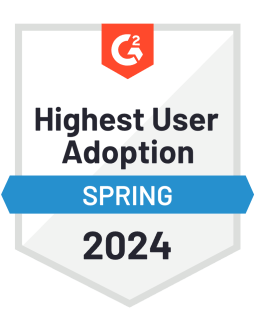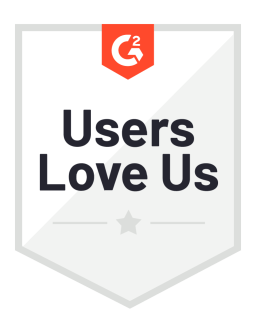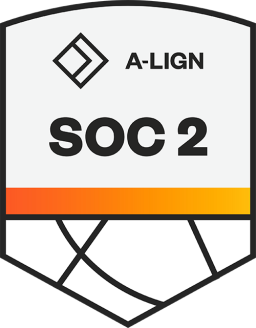When Facebook first opened up Messenger to brands, it was seen as just another way to address customer complaints. But with the introduction of chatbots in the past few years, and regular new features since then, the company is clearly positioning the app as a tool to enhance engagement throughout the customer journey, from brand awareness, to conversational commerce, to tech support — and every step in between.
Brand discovery
Product research
Sales and conversions
Follow--up communication
Service and support
Brand discovery
When consumers hear about a brand for the first time, they want to learn more and have an opportunity to engage before being asked to make a purchase. According to the marketing experts at Inman, the most leads are lost between when consumers first notice a brand and when they develop an active interest.
How can Facebook Messenger bots help you find and nurture potential customers?
1. Facebook ads can link directly to Messenger accounts
By linking their Facebook ads with their Messenger accounts, brands can use targeted ads to bring their desired audience right to their doorstep, giving them the opportunity to engage with consumers on a one-to-one level and build a relationship before trying to make a sale, perhaps with the assistance of a chatbot (more on that later).
Product research
Consumers are tired of generic and impersonal experiences, especially when researching products and services. Case in point, a study by SmarterHQ found that 70% of Millenials feel frustrated when a brand sends them irrelevant emails. At the same time, McKinsey & Company finds that successful personalization programs can yield more engaged customers and improve customer experience, helping boost conversion rates by as much as 15%.
How can Facebook Messenger bots help you provide the tailored interactions that consumers crave?
2. Chatbots can help customers focus their research
In this example, when Matt asks for information about credit cards, the chatbot pulls options from Omega Bank’s website for him to browse. If he sees a product that interests him, he can click for more details or choose to browse a more targeted list. For example, if Matt clicks "See more like this," the chatbot will display other Omega credit cards that offer rewards.
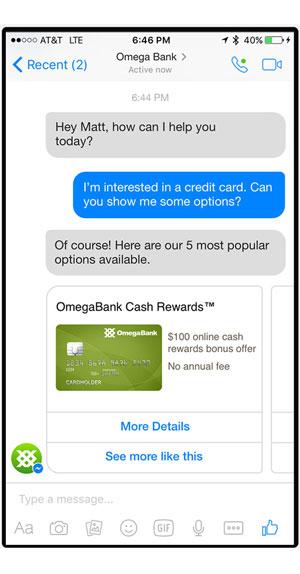
3. Chatbots can follow up with personalized marketing messages
Facebook allows brands to follow up on a conversation with an additional message. Just as you might send an automated email about an item left in an e-commerce cart, a chatbot can send an automated message about an item it "discussed" with the consumer. But while the chance of a follow-up email being opened is only around 10%, messaging apps have boasted an open rate of as much as 60% or more.
4. Chatbots can learn customers' preferences over time
Through artificial intelligence and deep learning, chatbots use interaction history to develop a specific profile of each customer, allowing them to deliver personalized messages, content, and product suggestions.
Sales and conversions
In today's omnichannel world, you won't succeed by asking customers to come to you. You have to meet them where they already are. When customers are already on Messenger, it's crucial to allow consumers to make purchases without leaving the app.
How can Facebook Messenger bots help you create effortless conversions?
5. Facebook Messenger allows direct payment from consumers to brands
Facebook first announced in September 2016 that brands would be able to use chatbots to start accepting e-commerce payments. Available only in the US, Facebook Pay enables consumers to make purchases using the credit card and shipping info they already have stored in either Facebook or Messenger, without having to navigate to an external website.
6. Chatbots can provide support during the purchase process
Over 80% of consumers require some degree of customer support while shopping online, and 77% won’t buy at all if chat isn’t available during the purchase process. Facebook Messenger is tailor-made to meet that demand, providing always-on, instantly accessible answers. Chatbots can even use customers’ conversation history to personalize its responses, which further increases conversion rates.
Follow-up communication
An inContact survey found that 87% of customers would welcome proactive customer service communication, and 73% of those who had a positive experience said it improved their perception of the company.
How can Facebook Messenger bots help you answer customers’ questions before they even ask?
7. Chatbots can proactively send urgent alerts through Facebook Messenger
Chatbots are always on and can act on information immediately. Here, Omega Air uses messaging to notify the customer that her flight has been delayed, instead of leaving her to discover the issue when she arrives at the airport.
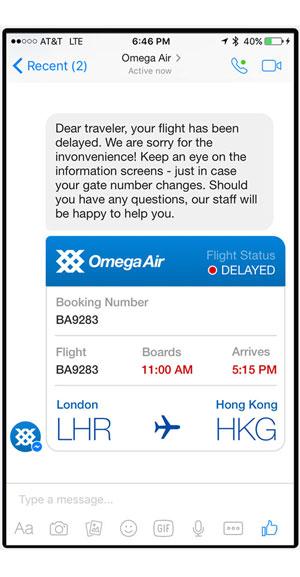
8. Chatbots can personalize follow-up communications
Omega Air’s chatbot lets the customer know that check-in for her flight is open. It then automatically walks her through the steps to receive her boarding pass, all within the app, to give her an effortless experience.
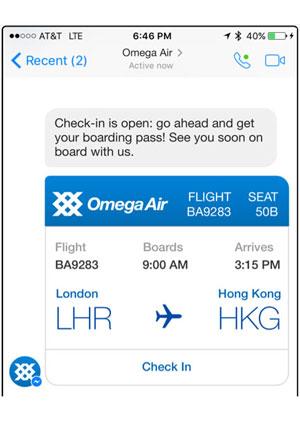
Service and support
Nine out of 10 consumers expect every company to offer 24/7 online self-service. Even the smallest businesses can meet that demand by using chatbots—and they don’t have to lose the personalized, one-to-one level communication that enables top-notch support interactions.
How can Facebook Messenger bots help you provide service that drives customer retention and loyalty?
9. Chatbots can perform simple tasks in place of human agents
Chatbots use artificial narrow intelligence (ANI) to automate repetitive, straightforward tasks: Omega Air allows the customer to request a seat change through Facebook Messenger, which the chatbot handles easily and immediately. And unlike humans, chatbots don’t get bored doing the same task over and over again!
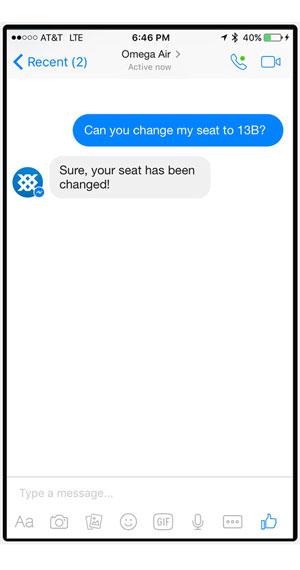
10. Chatbots can find the one right answer to complex questions
Chatbots use natural language processing (NLP) and automated back-and-forth "conversation" to determine the intent of a customer’s question. They then gather relevant information from the company’s website, knowledgebases, FAQs, documents, and trusted external sites and sift through it to find the answer. Finally, they simulate human conversation to respond.
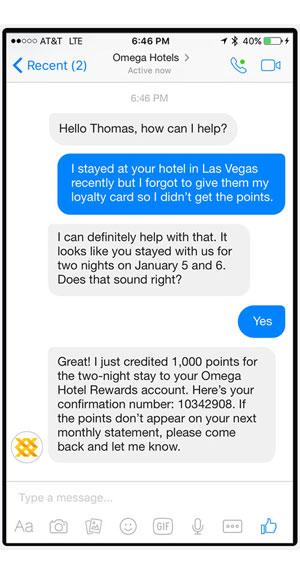
11. Chatbots can personalize support interactions
Chatbots can connect to your CRM to pull in customer information, purchase history, previous interactions from other channels, and other contexts. The Omega Hotel chatbot already knows Thomas’ loyalty program ID and the date of his last stay, so it can easily credit the points to his account.
12. Chatbots can seamlessly escalate to live agents
Despite chatbots’ robust capabilities, they will inevitably encounter requests that are too complex or sensitive for them to handle. Chatbots can be programmed to respond to certain triggers, such as language that indicates frustration, threats to move to a public channel, or repeated requests for the same information.
When that happens, the chatbot offers to escalate the interaction to a human agent via chat, voice, or video. And it passes detailed information about the Facebook Messenger interaction to allow the agent to pick up the conversation where it left off, instead of forcing the customer to repeat their story.
To learn how Emplifi can help you use Facebook Messenger chatbots to support every stage of the customer journey, request a personalized demo.
Editor's Note: This article was originally published on astutesolutions.com. Any statistics or statements included in this article were current at the time of original publication.



















